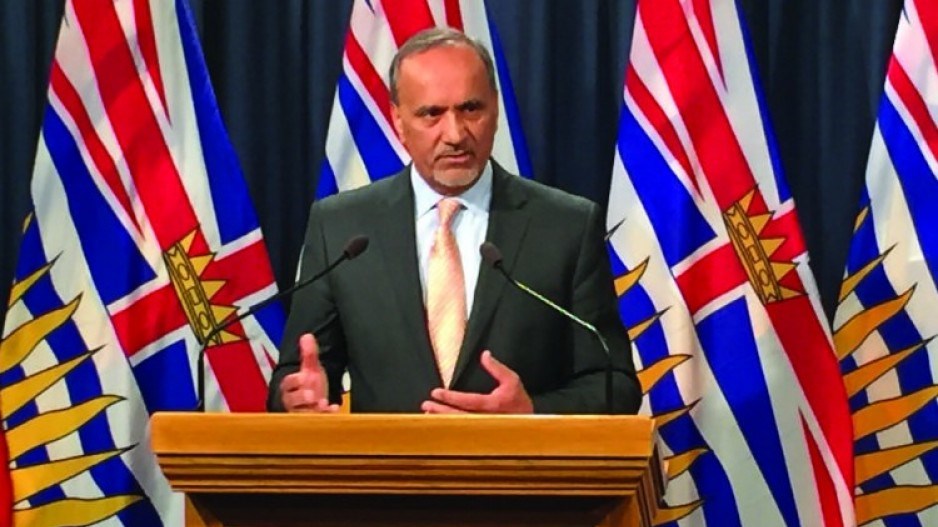While employers and unions haven’t rejected recommendations from the panel appointed to modernize B.C.’s Labour Relations Code, both camps argue that the report could have done more to support each of their interests.
The B.C. government began the labour code review earlier this year when it appointed a three-member panel to consult with the public and key stakeholders. The panel included union and business representatives.
B.C.’s Labour Ministry received 49 responses to its call for comment on the panel’s recommendations.
Labour Minister Harry Bains said he also met with key groups for input.
The Labour Relations Code was last reviewed 15 years ago, so some business and union groups agreed that a review was overdue. However, some industry groups, including the BC Chamber of Commerce and the Greater Vancouver Board of Trade, were signatories to a letter to the government asking it to maintain the code as it is.
It pointed to an era of what they consider to be relative labour stability with fewer strikes and lockouts than what had characterized the B.C. labour front at the end of the 20th century.
Jock Finlayson, executive vice-president and chief policy officer for the Business Council of British Columbia (BCBC), said most business groups are nervous about labour code changes by a government that has close ties to the union movement.
“If it isn’t broken, don’t try to fix it,” Finlayson said.
But union representatives don’t see the past two and a half decades through the same lens. Steve Hunt, director for Western Canada of the United Steelworkers, said good labour relations resulted from good mediation by people like Vince Ready, who has helped settle a number of high-level disputes, rather than the text in the labour code.
Hunt also pointed to successful court challenges by unions of BC Liberal legislation affecting health-care workers and teachers during the Gordon Campbell and Christy Clark governments.
The most contentious element of the labour code review was whether B.C. should eliminate the use of the secret ballot during union certification drives and replace it with a card-check system that requires only signatures of a majority of employees to organize into a labour union.
In a potential win for employers, the panel recommended the secret ballot be retained. Both the panel chairman and the lawyer representing businesses agreed with the recommendation; Sandra Banister, the lawyer representing unions, wrote a dissenting opinion.
Business groups argue that the secret-ballot process prevents employees from being pressured by union organizers; unions say it allows employers to improperly influence the process.
According to the review panel’s report, a card-check system is 9% more likely than the secret-ballot system to result in unionization.
BC NDP Premier John Horgan voiced support for a return to a card-check system during his campaign.
His minority government partner, BC Green Party Leader Andrew Weaver, does not share that view, which could prove troublesome for the government if the recommendation isn’t followed.
Bains declined to comment on individual recommendations. He said the government has made no decisions yet and will wait to first review the comments gathered from the public consultation period.
The other potential win for businesses is continued restrictions on secondary picketing. During the 1992 review of the labour code by the previous NDP government, the government agreed to limit union picketing of other businesses in supply chains and distribution channels of a company in a labour dispute. This was in exchange for the prohibition of replacement workers, according to the panel’s report.
While the committee recommended retaining secret ballots, it also recommended reducing the time between an application to certify and voting on union certification to five days from the current 10 and placing restrictions on mail-in ballots.
Finlayson said these recommendations are of little concern to business.
One potential gain for unions is the recommendation to change successorship rules.
Currently if there is a change in union representation, an existing collective agreement remains in place. The panel recommended that where a successor union inherits a contract with more than two years remaining, the union can apply to the Labour Relations Board to renegotiate the agreement.
Finlayson said that this could be disruptive in some industries like construction, where terms of labour agreements are tied to spending and investment decisions. One of the recommendations that BCBC members are highlighting to the organization is the proposed limit on employer communication with workers during the voting process. The panel’s report said that the recommendation was made because it is difficult for employers to provide objective information when their views are not aligned with those of employees.
The recommendation, aimed at preventing employees from being intimidated, would restrict what employers can say during the union certification process.
The other proposed amendment that worries some business groups is automatic ratification if a company facing unionization engages in unfair labour practices.
The report found that out of 254 unfair labour practice complaints, 197 (77.6%) were against employers; 77% were meritorious. Fifty-four (21.3%) of the complaints were made against unions; the remainder were against individuals.
Finlayson said automatic certification is too far-reaching and that the BCBC suggested changes during the open comment period.




